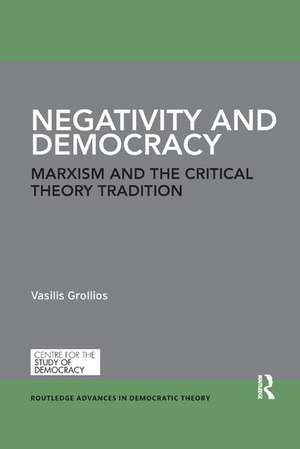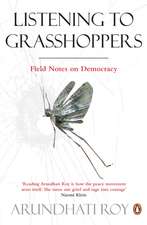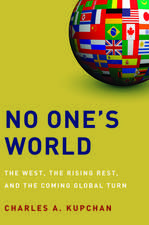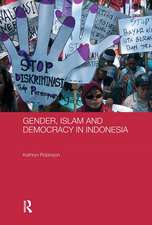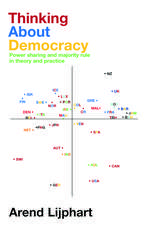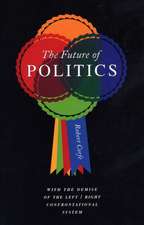Negativity and Democracy: Marxism and the Critical Theory Tradition: Routledge Advances in Democratic Theory
Autor Vasilis Grolliosen Limba Engleză Paperback – 14 aug 2018
Their thinking had the following common keywords: contradiction, fetishism as a process and the notion of spell and all its implications. The author makes an innovative attempt to bring these concepts to light in terms of their practical relevance for contemporary democratic theory.
| Toate formatele și edițiile | Preț | Express |
|---|---|---|
| Paperback (1) | 416.22 lei 6-8 săpt. | |
| Taylor & Francis – 14 aug 2018 | 416.22 lei 6-8 săpt. | |
| Hardback (1) | 1057.13 lei 6-8 săpt. | |
| Taylor & Francis – 24 ian 2017 | 1057.13 lei 6-8 săpt. |
Din seria Routledge Advances in Democratic Theory
-
 Preț: 107.16 lei
Preț: 107.16 lei -
 Preț: 326.14 lei
Preț: 326.14 lei -
 Preț: 286.81 lei
Preț: 286.81 lei -
 Preț: 407.57 lei
Preț: 407.57 lei -
 Preț: 444.08 lei
Preț: 444.08 lei -
 Preț: 439.78 lei
Preț: 439.78 lei -
 Preț: 412.37 lei
Preț: 412.37 lei -
 Preț: 425.59 lei
Preț: 425.59 lei -
 Preț: 381.98 lei
Preț: 381.98 lei - 5%
 Preț: 344.60 lei
Preț: 344.60 lei -
 Preț: 385.62 lei
Preț: 385.62 lei -
 Preț: 425.59 lei
Preț: 425.59 lei -
 Preț: 388.52 lei
Preț: 388.52 lei
Preț: 416.22 lei
Nou
Puncte Express: 624
Preț estimativ în valută:
79.65€ • 85.17$ • 66.41£
79.65€ • 85.17$ • 66.41£
Carte tipărită la comandă
Livrare economică 17 aprilie-01 mai
Preluare comenzi: 021 569.72.76
Specificații
ISBN-13: 9781138368170
ISBN-10: 1138368172
Pagini: 280
Dimensiuni: 152 x 229 x 27 mm
Greutate: 0.45 kg
Ediția:1
Editura: Taylor & Francis
Colecția Routledge
Seria Routledge Advances in Democratic Theory
Locul publicării:Oxford, United Kingdom
ISBN-10: 1138368172
Pagini: 280
Dimensiuni: 152 x 229 x 27 mm
Greutate: 0.45 kg
Ediția:1
Editura: Taylor & Francis
Colecția Routledge
Seria Routledge Advances in Democratic Theory
Locul publicării:Oxford, United Kingdom
Public țintă
Postgraduate and UndergraduateCuprins
Contents
Foreword
Werner Bonefeld
Acknowledgements
Introduction
Chapter 1: Marx and Engels’s Critique of Democracy:
The Materialist Character of their Concept of Autonomy
Chapter 2: Dialectics and the Transition to Socialism in Late F. Engels’s Philosophy of
History: Freeing Marx from the ‘Withering Away of the State’ theory
Chapter 3: Max Horkheimer’s Dialectics Rehabilitated: How Horkheimer’s ‘Open
Marxism’ Cracks Capitalism
Chapter 4: Dialectics and Democracy in Georg Lukacs’ Marxism
Chapter 5: False Social Totality and the Ineffable Integrity in T. Adorno’s Negative
Dialectics: The Critical Theorist and the Challenges of the 21st Century
Chapter 6: Determinate Negation of the One-dimensional Society: How Herbert
Marcuse’s Great Refusal Cracks Capitalism
Chapter 7: Finding Hope in the Nihilism of Bourgeois Life. Ernst Bloch’s Open Marxism
Reconsidered
Chapter 8: The Descendants of Negative Dialectics. Dialectics and Democracy in Open
Marxism
Foreword
Werner Bonefeld
Acknowledgements
Introduction
Chapter 1: Marx and Engels’s Critique of Democracy:
The Materialist Character of their Concept of Autonomy
Chapter 2: Dialectics and the Transition to Socialism in Late F. Engels’s Philosophy of
History: Freeing Marx from the ‘Withering Away of the State’ theory
Chapter 3: Max Horkheimer’s Dialectics Rehabilitated: How Horkheimer’s ‘Open
Marxism’ Cracks Capitalism
Chapter 4: Dialectics and Democracy in Georg Lukacs’ Marxism
Chapter 5: False Social Totality and the Ineffable Integrity in T. Adorno’s Negative
Dialectics: The Critical Theorist and the Challenges of the 21st Century
Chapter 6: Determinate Negation of the One-dimensional Society: How Herbert
Marcuse’s Great Refusal Cracks Capitalism
Chapter 7: Finding Hope in the Nihilism of Bourgeois Life. Ernst Bloch’s Open Marxism
Reconsidered
Chapter 8: The Descendants of Negative Dialectics. Dialectics and Democracy in Open
Marxism
Recenzii
‘ … it (the book) definitely deserves our attention as it provides a perspective on all of the key figures of the first generation of the Frankfurt school, from an entirely different angle from that of the well know classical studies of Martin Jay and David Held, with which the book can be compared.’ — Evangelos Liotzis, Capital and Class
'How do we get out of here? We know that capitalism is a catastrophe for humanity, but we seem to be trapped. All our struggles seem to lead us back to the same starting point: the reproduction, in one way or another, of the logic of capital, the logic of death and destruction. We desperately need to break the grammar of capital, the conceptual and organisational framework that leads us round and round in circles. That is why Vasilis Grolios’s book is so important. It is not just an excellent development of an intellectual tradition: it confronts us with the need to break deadening, death-bringing mainstream theory. Read it.' — John Holloway, Benemérita Universidad Autónoma de Puebla
‘I would highly recommend this book both to professional academics and students of political and social philosophy, sociology and political science, and to everyone non-academic who would like to develop a critical perspective of modern societies and their various and enduring pathologies.’ — Yiorgos Moraitis, Critical Sociology
‘Vasilis Grollios has written a timely and courageous book. His book is timely because, as Werner Bonefeld points out in his Foreword, ‘conventional democratic processes have been rocked by populist assertions about making this or that political economy great and strong’. His book is courageous because, as its subtitle indicates, it explores not merely specific formulations by a given theorist but Marxism and the ‘critical theory tradition’ as a whole.’ — Richard Gunn, Journal of Classical Sociology
‘… without question a work of important scholarship, in particular, his strong chapters on Adorno and Horkheimer as well as Marx demonstrate a powerful mind at work.’— Michael J. Thompson, Socialism and Democracy
'How do we get out of here? We know that capitalism is a catastrophe for humanity, but we seem to be trapped. All our struggles seem to lead us back to the same starting point: the reproduction, in one way or another, of the logic of capital, the logic of death and destruction. We desperately need to break the grammar of capital, the conceptual and organisational framework that leads us round and round in circles. That is why Vasilis Grolios’s book is so important. It is not just an excellent development of an intellectual tradition: it confronts us with the need to break deadening, death-bringing mainstream theory. Read it.' — John Holloway, Benemérita Universidad Autónoma de Puebla
‘I would highly recommend this book both to professional academics and students of political and social philosophy, sociology and political science, and to everyone non-academic who would like to develop a critical perspective of modern societies and their various and enduring pathologies.’ — Yiorgos Moraitis, Critical Sociology
‘Vasilis Grollios has written a timely and courageous book. His book is timely because, as Werner Bonefeld points out in his Foreword, ‘conventional democratic processes have been rocked by populist assertions about making this or that political economy great and strong’. His book is courageous because, as its subtitle indicates, it explores not merely specific formulations by a given theorist but Marxism and the ‘critical theory tradition’ as a whole.’ — Richard Gunn, Journal of Classical Sociology
‘… without question a work of important scholarship, in particular, his strong chapters on Adorno and Horkheimer as well as Marx demonstrate a powerful mind at work.’— Michael J. Thompson, Socialism and Democracy
Descriere
Explores the practical relevance of these notions for a contemporary democratic theory. Vasilis Grollios offers a unique overview of the key concepts of totality, negativity, fetishization, contradiction, mystification, identity thinking, dialectics and corporeal materialism as they have been employed by the major thinkers of the critical theory tradition – Marx, Engels, Horkheimer, Lukacs, Adorno, Marcuse, E. Bloch and J. Holloway.
